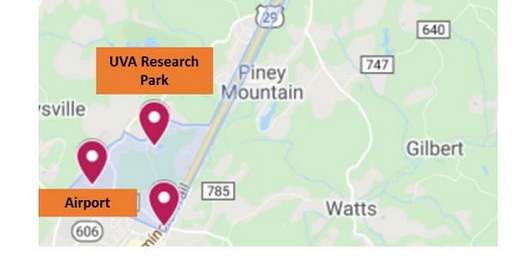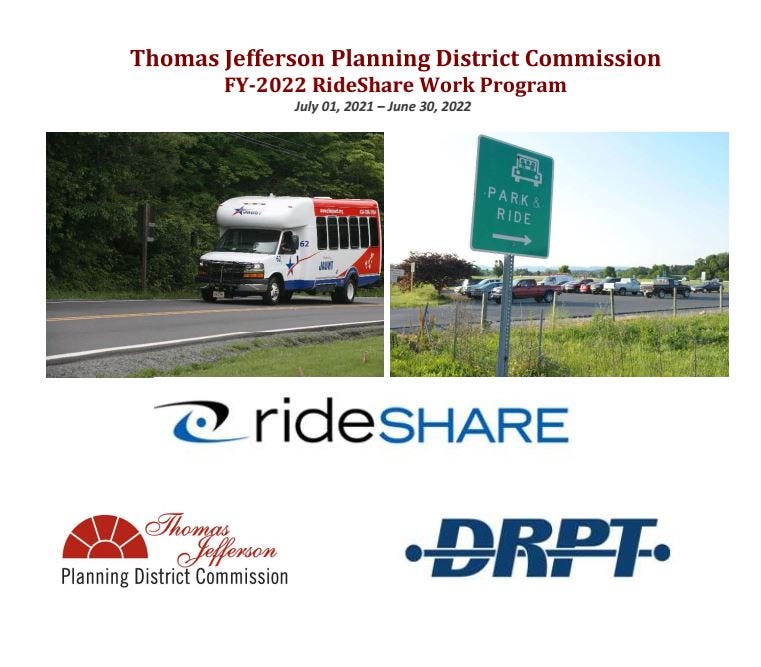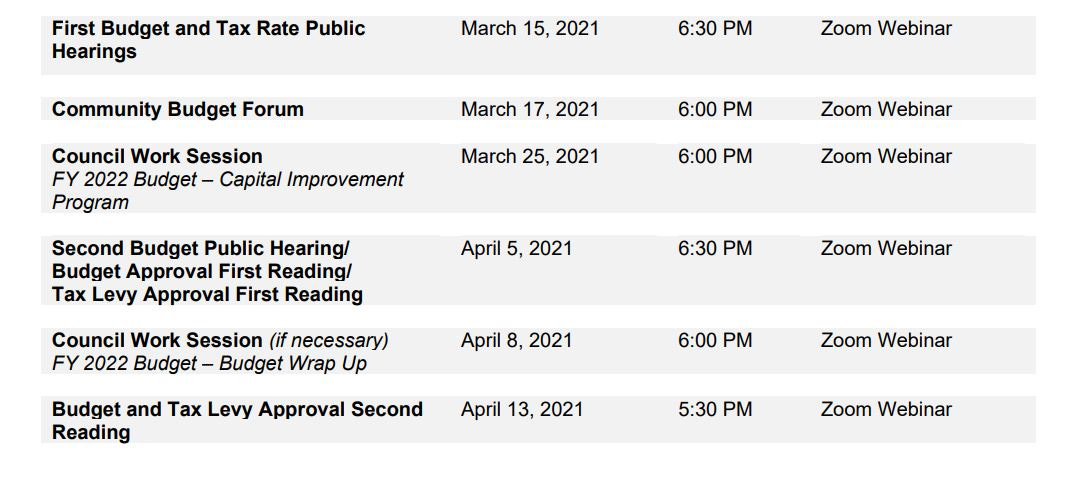Today's Patreon-fueled shout-out is for the Plant Northern Piedmont Natives Campaign, an initiative that wants you to grow native plants in yards, farms, public spaces and gardens in the northern Piedmont. Native plants provide habitat, food sources for wildlife, ecosystem resiliency in the face of climate change, and clean water. Start at the Plant Northern Piedmont Natives Facebook page and tell them Lonnie Murray sent you!
On today’s program:
Lots of transportation news from the Thomas Jefferson Planning District Commission
Charlottesville City Council takes a first crack at next year’s fiscal budget
Brief update on the pandemic
Let’s get a quick update on the pandemic. All metrics continue to trend downward, except for the number of fatalities. The Virginia Department of Health has been slowly catching up with death certificates from the post holiday surge, and 9,849 people are recorded as dying from COVID. And while the number of new cases each day has declined, they are still high. Today there were another 1,246 cases reported.

Today there is a long line once again at the former K-Mart where the Blue Ridge Health District is administering COVID vaccinations presumably the hundreds of people who got first doses on February 17. According to the VDH dashboard, 18 percent of Virginians have received at least one dose. Governor Ralph Northam acknowledged that milestone yesterday.
“We’ve achieved the aggressive goal we set back in January,” Northam said. “Back then as you remember, just a few weeks ago our goal was to get to 25,000 shots a day and we accomplished that. We set a long-term goal that to get everyone vaccinated by this summer would be 50,000.”
The seven-day average is currently 50,877 shots a day
This week the Centers for Disease Control issued new guidance that allows people who have had all of their shots to be able to gather indoors with others who are also protected. (read the guidance)
Still, the pandemic remains with us. On Monday, the Virginia Department of Health announced the South African variant has been found in their central region.
“The B.1.351 variant, which first emerged in South Africa in late 2020, is associated with increased person-to-person transmission of COVID-19,” reads the press release. “At this time, there is no evidence that infections with this variant cause more severe disease.”
I’ll have more from this press conference in a future program.
For many of us, the pandemic has meant working from home. When this time ends, many of us may be looking for a different way to get to and from our workplace. On March 4, the person who runs a service that seeks to get people out of their cars told members of the Thomas Jefferson Planning District Commission about her work. Sara Pennington explained Rideshare.
“We are a program that was established actually in 1980 at Jaunt through the Virginia Department of Rail and Public Transportation to provide carpool and vanpool matching services and support,” Pennington said. “The program later moved to the TJPDC and then in 2009 we expanded our coverage to include the Central Shenandoah Planning District Commission so we kind of work in conjunction with our folks across the mountain.”
RideShare also offers a guaranteed ride home program to give people who may have to get home at a different time the occasional option when there are sudden changes of plan.
“That is a great comfort and always what we hear as the first deterrent that keeps folks from taking that alternative transportation,” Pennington said.
RideShare also assists with helping companies with teleworking logistics, and is currently conducting a survey to gauge interest in coworking. Pennington said Rideshare has continued to operate during this last year.
“Even though things this year have been weird with the pandemic there are still some folks who are going into work and who may still need those commute services, so none of that has stopped,” Pennington said. “But we have pivoted a lot of our direction and our resources and information sharing into the field of telework.”
The TJPDC is currently working on several transportation studies, including a small area plan for Zion Crossroads and a look at the U.S. 29 corridor north of Airport Road in Albemarle County to U.S. 33 in Greene County. Jessica Hersh-Ballering is a transportation planner.
“The overall purpose of this corridor study is to develop broad transportation recommendations that complement the existing land use designations in the study area,” Hersh-Ballering said.
There are several new developments either under construction or in the planning stages in both Albemarle and Greene.
The TJPDC is also supporting efforts to expand non-motorized infrastructure. Sandy Shackelford is the director of Planning and Transportation.
“One of those is the expansion of the Virginia Capital Trail from Richmond through our region, through the Charlottesville area and even west into Staunton,” Shackelford said.
Shackelford said the current task is to identify an alignment for such a trail.
“It could be right now kind of looking at maybe some of these are on-street connections with a goal in the future to maybe have a set-aside shared-use path kind of facility, but that’s what they’re starting to work towards now
Shackelford said her staff also supports the Regional Transit Partnership, which is at the beginning stages of creating a regional vision for public transportation.
At the end of the TDJPC meeting, Commissioners had the chance to give updates on what’s happening in their community. City Councilor Michael Payne said new city City Manager Chip Boyles is settling in.
“The major thing for us in Charlottesville especially over the next year is really rebuilding our organization and getting it to a better place,” Payne said. “Chip has entered on with a daunting task but perhaps not surprisingly to some of the people here, the work has already started. I’m optimistic that we’re moving into a much more stable place.”
Payne also mentioned that the city is considering a one-cent sales tax to help cover the costs of reconfiguring the schools. That would take approval by voters in a referendum after passage of enabling legislation by the General Assembly.
“And all that revenue would go strictly to school facilities,” Payne said. “What we’ve heard from our representatives is that it will be much more likely to happen and happen quicker if we have a groundswell of many localities saying this would be a useful power for us to have.”
The Louisa County recently banned the practice of people asking others for money within medians. Bob Babyok is the board’s chair.
“On Monday, 1 March, we also approved the panhandling prohibition so no more panhandling in Louisa,” Babyok said.
Jesse Rutherford of the Nelson Board of Supervisors told the TJPDC that there’s a lot of activity happening in that county.
“Here in Nelson we have a lot of opportunity coming as it relates to revitalization of Lovingston and hopefully we’re going to get some good efforts moving forward on some housing development,” Rutherford said.
Nelson County currently has a population of about 15,000 according to the most recent estimates from the Weldon Cooper Center for Public Service at the University of Virginia.
Rutherford also raised an important issue worth considering as the pandemic recedes.
“You know we haven’t had foreclosures in almost a year,” Rutherford said. “Since March there has been a prohibition on any foreclosure that is related to a loan that is insured by the federal government which sets a dangerous precedent potentially this summer when that foreclosure ban is raised.”
Certainly an issue to know more about. The moratorium in Virginia is currently scheduled to end on June 30.
Charlottesville City Council began their review of City Manager Chip Boyles’ recommended fiscal budget for fiscal year 2022. (review the budget)
“We’ll provide a recommended balanced budget of $190,689,839,” Boyles said. “Included in this recommended budget are several identified Council priorities of affordable housing, racial equity, safety and security, workforce development, as well as investment in our employees.”
The budget will be adopted in about five weeks after a series of work sessions, and after that, work will begin on updating the city’s strategic plan as a first concrete step towards creation of a budget for fiscal year 2023. Senior Budget Management Analyst Krisy Hammill detailed some of the Council priorities.
“For racial equity, we are fully funding the deputy city manager of race, equity, diversity, and inclusion, the Home to Hope program, the food equity initiative, the Office of Human Rights, in addition to the city’s minority business activities,” Hammill said.
A request to fully fund the Police Civilian Review Board at $350,000 has been granted. Other requests, however, were not included in the budget. There is no pay raise for employees, for instance. An open issue is whether to fulfil the school system’s full budget request, which does include a pay raise. Hammill offered various scenarios. Watch the video to learn more.

















Share this post